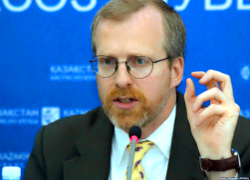Ukraine's future in peril under President Yanukovych
6- David J. Kramer, Washington Post
- 3.12.2013, 17:17
- 17,326

During the Orange Revolution hundreds of thousands of Ukrainians took to the streets, outraged by a rigged election that would have elevated Viktor Yanukovych to the presidency.
Their efforts forced a rerun of that election and led to his defeat. Viktor Yanukovych, however, made a political comeback and narrowly won the presidency in 2010.
Today, he is once again the target of many Ukrainians’ ire, this time for spurning the European Union by deciding not to sign association and free-trade agreements at last week’s Eastern Partnership Summit in Vilnius, Lithuania. In so doing, Yanukovych placed his personal interests above those of his country, and many Ukrainians have decided, as in 2004, that they have had enough of his corrupt and increasingly authoritarian rule.
October polling found that more than three times as many Ukrainians supported signing agreements with the European Union than aligning with Russia. Threats from Russian President Vladimir Putin to cut off trade and gas gave Yanukovych cover to opt out of the E.U. deals, but the tactics galvanized support among Ukrainians for the agreements. However, Putin’s threats do not explain the real reason Yanukovych rejected the E.U. deals.
Yanukovych has never cared about integrating his country into EuroAtlantic institutions unless it would help him personally. After defeating his arch rival, former prime minister Yulia Tymoshenko, Yanukovych and his family used their rise to power to enrich themselves. Last year, “family-ization” became the term widely used in Ukrainian political circles to describe the alleged massive corruption by the Yanukovychs. One of the president’s sons, trained as a dentist, became one of Ukraine’s hundred richest people in 2011; one can only imagine his unreported income — and that of his relatives.
Yanukovych has more than a monetary interest in retaining power. Were he to surrender his office, he, his sons and others in his close circle could be investigated and even prosecuted. He might switch places with Tymoshenko, whom Yanukovych had jailed in 2011 after a widely condemned prosecution for abuse of power.
Still haunted by Tymoshenko’s role in the 2004 Orange Revolution, Yanukovych has sought to prevent her from ever again posing a political challenge to him. When E.U. officials insisted that Tymoshenko be pardoned or at least released on humanitarian grounds because of debilitating back problems, Yanukovych declined.
Just days before the Vilnius meeting, he accused E.U. leaders of meddling in Ukrainian affairs and argued, according to Reuters, that Tymoshenko’s imprisonment should not hold up the deals: “ ‘The [Ukrainian] courts, which she has been evading and thereby obstructing justice, should give the answer. What does the European Union have to do with this? Is the European Union a court?’ Yanukovych said in a televised interview.”
The European Union was right to insist on Tymoshenko’s release as a condition of the agreements. This is less about her situation than about Yanukovych’s use of selective prosecution to eliminate perceived political threats. To undermine a challenge from boxing champion Vitali Klitschko, who declared his run for the presidency in October, Yanukovych pushed through his rubber-stamp parliament legislation that would bar the candidacy of anyone who has lived and paid taxes in another country. Klitschko, who lived in Germany during his boxing days, is thought capable of defeating Yanukovych in a runoff.
Eliminating the second round of presidential voting is Yanukovych’s next priority, as polling has shown that he would lose to Klitschko in a second round but could win a plurality in a first round if a disjointed opposition splintered the protest vote. His low approval rating — around 20 percent — is likely to be damaged by his recent decisions; imprisoning his opponents and disqualifying them from political competition have become Yanukovych’s only viable options for staying in power.
This week Ukraine is to host the ministerial meeting of the Organization for Security and Cooperation in Europe. E.U. foreign ministers should follow the lead of Secretary of State John Kerry, who rightly decided not to attend. Those Western officials who travel to Kiev should skip the formal meetings and appear among the protesters to show solidarity. They also should make clear that the government’s use of force against protesters — authorities violently broke up several demonstrations over the weekend — would kill any possibility of future agreements with Europe as long as Yanukovych remains president. Such actions also should trigger targeted sanctions along the lines of the Magnitsky legislation that the United States passed to hold accountable Russian officials involved in gross human rights abuses.
Targeted measures against Ukrainian officials, including Yanukovych and his sons, may be the only way to prevent further bloodshed, to secure Tymoshenko’s release, to reverse the legislation that bans Klitschko from running for president and to renew Ukraine’s hopes for integrating with the West. Such measures would also send a strong message of support to the hundreds of thousands of Ukrainians who have been protesting Yanukovych’s second attempt in a decade to hijack Ukraine’s future.
David J. Kramer, Washington Post










